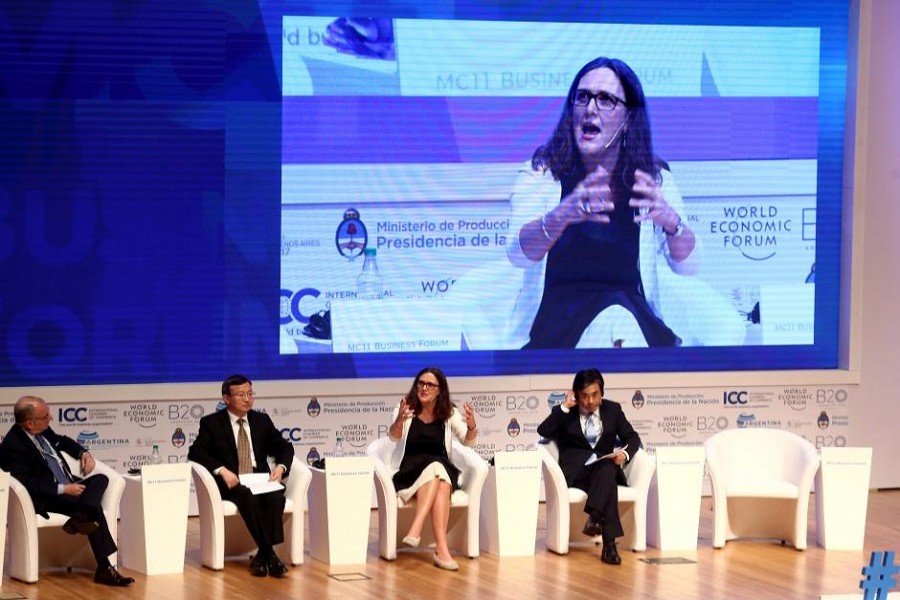The World Trade Organisation failed to reach any new agreements on Wednesday, ending a three-day ministerial conference in discord in the face of stinging US criticism of the group and vetoes from other countries.
The stalemate dashed hopes for new deals on e-commerce and curbs to farm and fisheries subsidies and raised questions about the body’s ability to govern increasingly disputed global trade.
The frustrations led some ministers, including US Trade Representative Robert Lighthizer, to suggest that negotiations among smaller groups of “like-minded” WTO countries were a better approach going forward.
“We have not achieved any multilateral outcomes,” European Union Trade Commissioner Cecilia Malmstrom told a news conference. “The sad reality is that we did not even agree to stop subsidizing illegal fishing.”
She said the meeting laid bare one of the WTO’s biggest deficiencies - that all agreements must have the unanimous consent of all 164 member countries. She said the United States was partly to blame but that other countries also blocked progress.
WTO Director-General Roberto Azevedo added that WTO members needed to do some “real soul searching” about the way forward and realize they cannot get everything they want.
“Progress was going to require a leap in members’ positions,” Azevedo said at the event’s closing ceremony. “We didn’t see that.”
He said US moves to block WTO appeals judges, which could disrupt the body’s dispute settlement system, were not discussed as a formal topic, but several ministers voiced concerns in statements at the conference.
The failure to agree on new deals means that talks on the same trade topics will continue. WTO delegates agreed to set a new goal for a reaching a comprehensive fisheries subsidy by the time of the next ministerial conference in 2019.
Trade ministers instead emphasized the WTO’s post-conference work programs, such as efforts to improve market efficiency, curb excess industrial capacity and improve subsidy transparency.
‘Plurilateral arrangements’
Malmstrom said “short-term plurilateral arrangements within the WTO framework” were the best way forward. Two such arrangements came together at the Buenos Aires conference.
On Wednesday, some 70 members, including the United States, European Union and Japan, pledged to forge ahead with negotiating rules on electronic commerce after a broader deal among the full membership failed. Absent from the group were China, India, Vietnam and Indonesia.
The EU and Japan joined the United States on Tuesday in vowing to combat market-distorting policies, such as those pervasive in China that have fueled excess industrial capacity, including subsidies for state-owned enterprises and technology transfer requirements.
“The potential focus on plurilateral negotiations between like-minded countries is a natural and positive outcome, if it turns out to bear fruit,” said Chad Bown, a senior fellow and trade expert at the Peterson Institute for International Economics in Washington.
Bown said a good template would be the 1996 WTO Information Technology Agreement, which initially had just 29 countries lowering tariffs on IT products. That has since expanded to 82 countries covering 97 per cent of trade in the sector.
The WTO conference’s chair, former Argentine Foreign Minister Susana Malcorra, defended the WTO’s need for unanimity among its large and unruly membership, saying it was the still the best forum to deal with trade disputes.
“Let’s better work to strengthen WTO, because the alternative is the jungle,” she said.
At first, “America first”
The conference began with Lighthizer setting an acrimonious tone with sharp criticism of the WTO, telling ministers on Monday that it was impossible to negotiate new rules while many of the current rules were not being followed, and that the WTO was losing its focus and becoming too litigation-focused.
Driven by President Donald Trump’s “America First” strategy and a preference for bilateral deals, the United States had pushed against ministers drafting a perfunctory ministerial that included references to the centrality of the global trading system and to trade as a driver of development. The statement was ultimately blocked.


